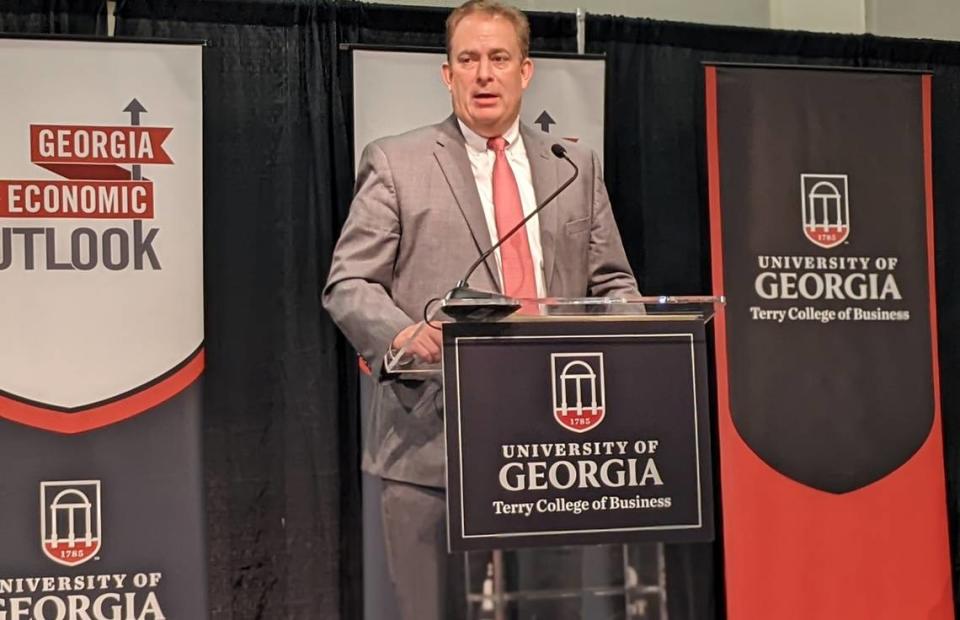Georgia and Columbus will almost ‘fully recover’ from COVID recession in 2022. Here’s why
Economists at the University of Georgia predict that Columbus and the state will almost completely recover from the COVID-19 recession in 2022.
Georgia’s projected growth rate will exceed the historic average but trail behind 2021 movement. Consumer spending, business investments and the housing market will drive the statewide economy, creating more steady and widespread growth than in 2021.
Columbus was hit by the coronavirus-related recession, but not as hard as other communities because of Fort Benning’s large government sector presence. The city has slowly recovered, but its economic outlook is stable.
The economists laid out their predictions in Columbus Thursday at the 2022 Georgia Economic Outlook luncheon hosted by UGA’s Terry College of Business.
“The outlook for Columbus is good,” said Jeff Humphreys, director of the Selig Center for Economic Growth at the Terry College of Business. “The risk of recession is low. You will fully recover in terms of (gross domestic product) in 2022 and fully recover in terms of jobs in 2023.”
Columbus’ economic outlook
Columbus was largely insulated from the worst of pandemic-related job losses, the economists said.
Columbus lost 11% of its jobs from the pre-pandemic peak, most of it coming from the leisure and hospitality industries, state government, and professional and business services, Humphreys said.
By November 2021, Columbus recovered about 66% of the jobs it lost during the pandemic. The rate lagged behind Georgia’s 92% and the U.S’s 83% recovery rate.
The Columbus metro area has about 4,400 fewer jobs than it did before the pandemic. Humphreys projects that 2,400 jobs will be added to the area this year.
Several positive factors bode well for the city, including the presence of Fort Benning, Columbus State University and larger than average proportions of Generation Z and millennial residents, Humphreys said.
Fort Benning is the city’s largest employer, followed by Aflac, Piedmont Columbus Regional and St. Francis-Emory Healthcare.
Healthcare remains a big industry for the city, and the recently-finished Mercer University medical school campus will be a “big booster” for the industry. Remington Firearms’ move to nearby LaGrange is also big for the state, Humphreys said.
Negatives for the city’s economic future include the closure of the Campbell Soup Company plant. The iconic downtown facility was once run by Tom’s Food.
Net migration and education levels in the Columbus area also are below average.
Home prices in Columbus were up 19% from pre-pandemic levels. Prices are expected to rise in 2022, but at a slower rate, Humphreys said.
What’s next for Georgia?
The state economy is expected to see a growth rate of 4.3%, down from 5.8% in 2021 but above the historic average, said Ben Ayers, Dean of UGA’s business school.
Georgia’s GDP fully recovered last year, and jobs numbers are expected to fully recover this year. The state is outpacing the nation.
The biggest change in this year’s forecast from the previous two years is that the private sector will be the economy’s main driver. Consumer and business spending, the housing market and job growth will push the state forward, Ayers said.
Several factors could cause the economy to grow faster than expected, Ayers said. Consumers could spend more of the excess savings they’ve accumulated over the last two years.

The labor force could grow as people return to the job market after leaving to take care of loved ones during the pandemic. The state’s estimated unemployment rate is 3.2%, below the 4.1% rate nationally.
Single-family home building is expected to increase by 8% in 2022. As of late 2021, home prices in Georgia were 23% above the pre-pandemic level. Home prices are expected to increase around 4% statewide, Ayers said.
Risks to Georgia’s economy include supply chain issues, worker shortages and the ongoing coronavirus pandemic.
Supply constraints could cause inflation to run stronger or longer than expected. The Federal Reserve could raise interest rates higher and quicker than expected, which could trigger a recession. But the risk of recession is low, Ayers said.
The outlook remains largely positive.
“2022 is going to be a good year,” Ayers said.

